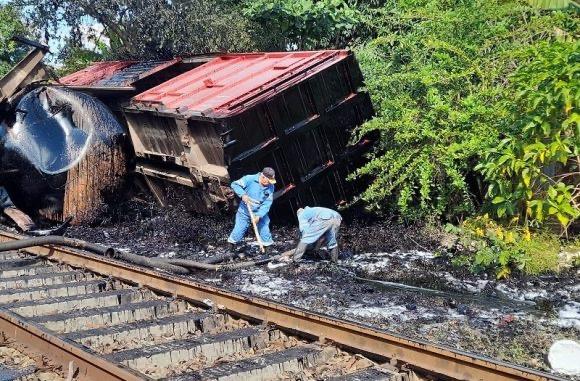
In a brief message on the social network Facebook, the company announced that workers from the Sergio Soto Refinery are working to recover part of the approximately 60,000 liters of Cuban crude stored in one of the cars of the two freight trains that had an accident on Saturday morning.
According to the digital page of the weekly Escambray, Carlos Enríquez Díaz Bernal, the deputy director of the aforementioned refinery located in Cabaiguán, specified that the extraction is intended for the tank trucks of the industry.
Meanwhile, the causes of the incident are being investigated, which involved a vehicle transporting resources from the Mariel Special Development Zone to Camagüey and another vehicle coming from the deposits in the Avila region for further fuel processing.
Despite the severe collision and significant economic losses, no human casualties were reported, according to a social media post by Eduardo Rodríguez Dávila, the island's Minister of Transportation.
In 2024, train accidents in Cuba have become a recurring problem, reflecting the deterioration of infrastructure and the lack of safety at railway crossings.
One of the most notable incidents was the derailment of a passenger train in Matanzas on September 28, which disrupted service on the Central Line and left hundreds of people stranded at stations such as La Coubre in Havana.
On the same day, another train derailed at kilometer 149.2 of the same line, affecting railway operations throughout the region.
Collisions between trains and vehicles have also been a part of this issue.
On July 16, a train collided with a Hyundai car in Santa Clara, Villa Clara, causing significant damage to the vehicle, although no injuries were reported.
Similarly, on February 19, another car collided with a tourism vehicle on Vento Street in Havana when the vehicle failed to yield at a stop sign, a common occurrence at intersections across the island.